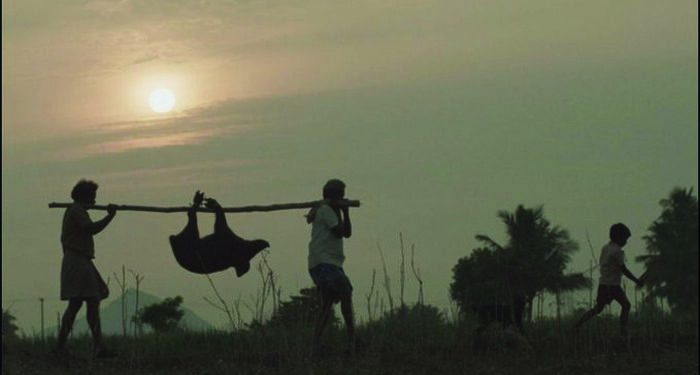R ARIVANANTHAM
Seththumaan, a film based on the short story ‘Sirugari’ written by eminent writer Perumal Murugan, is an important addition to the legion of films that speak of the politics behind the personal food culture which is defined as ‘the ideas, customs, and social behaviour of a particular community or people’.
இந்த தாத்தா பேரனின் அழகான உறவை இன்றே பாருங்க SonyLIV-இல்.#SeththumaanOnSonyLIV #Seththumaan @officialneelam @Beemji #Thamizh @anthoruban @Ecspremkumar @BindhumaliniN @stunner_sam @pro_guna pic.twitter.com/P7cRIP2dgZ
— Sony LIV (@SonyLIV) May 27, 2022
While history is written by victors, culture is controlled by the privileged. Indian history with caste and Brahminism has ensured that people from the oppressed communities and their lifestyles have been systematically ostracised. Tamizh’s directorial debut, Sethumaan is an important addition to the legion of films that speak of the politics behind the personal.
It would be more accurate to call Seththumaan, a lifestyle movie. It follows the life of Poochiyappa (Manickam) and his grandson Kumaresan. Poochiyappa, who weaves and sells baskets, is single-handedly raising his grandson who had lost his parents to a hate crime. After this, Poochiyappa had decided to ensure that his grandson has a better life.
According to Poochiyappa, his grandson is like a bird, he will fly away to faraway places and live well.
Fed up with his life’s struggles, he advocates his grandson to study well and come out with flying colours and lead an exemplary life.
Low-budget film Seththumaan exposes the hierarchy and the system which rewards when ‘you know your place’. And Poochiyappa’s landlord, Vellaiyyan seems to reward his rebellious servant with empathy. But, his relationship with the more outspoken Rangan is very different.
Take Vellaiyan’s desire to eat pork. He constantly mentions the health benefits of consuming it. But he won’t cook it at his house. He wants to get a pig that is ‘clean’ and is fed only ‘clean things’. The rationalisations are ironic and sometimes amusing. And it’s not just Vellaiyan who does it. Poochiyappa does it too. When Ranga asks him to get tea in glasses from now on, Poochiyappa says, ‘I am wondering if I want to drink from the glasses that these men use’.
Vellaiyan’s wife is caustic about his desire to eat pork. Her relationship with Poochiyappa is also barbed with slights and snubs. All of the men who come to eat pork complain that their wives won’t allow it. It’s a small intersectional insight into the complex functionings of Brahminical patriarchy and its mechanisms. It also makes a pertinent point about how Dalits tend to become victims even if the conflict doesn’t involve them directly.
Seththumaan is a symbol of how Dalits have to effectively recontextualise their habits and lifestyles to overcome the taboo they have been forced to carry all these years. The film daringly bares the trials and tribulations of Dalits even after 75 years Independece.
The film released on OTT platform by Sony Live on Friday.









